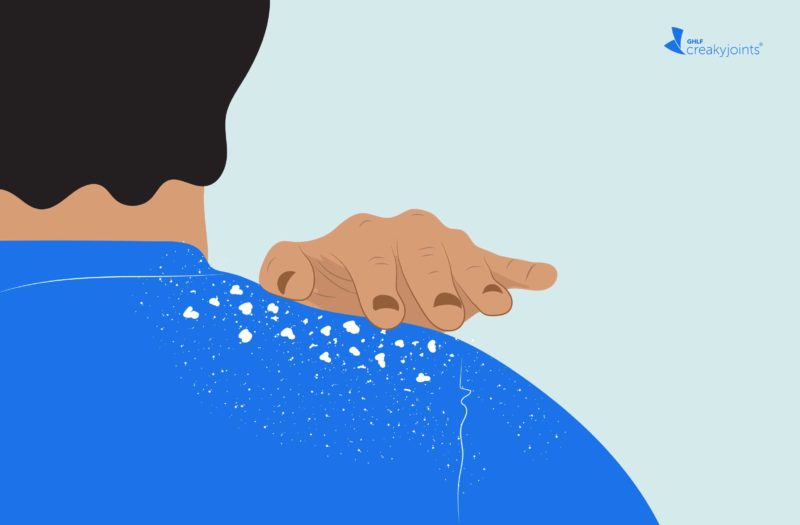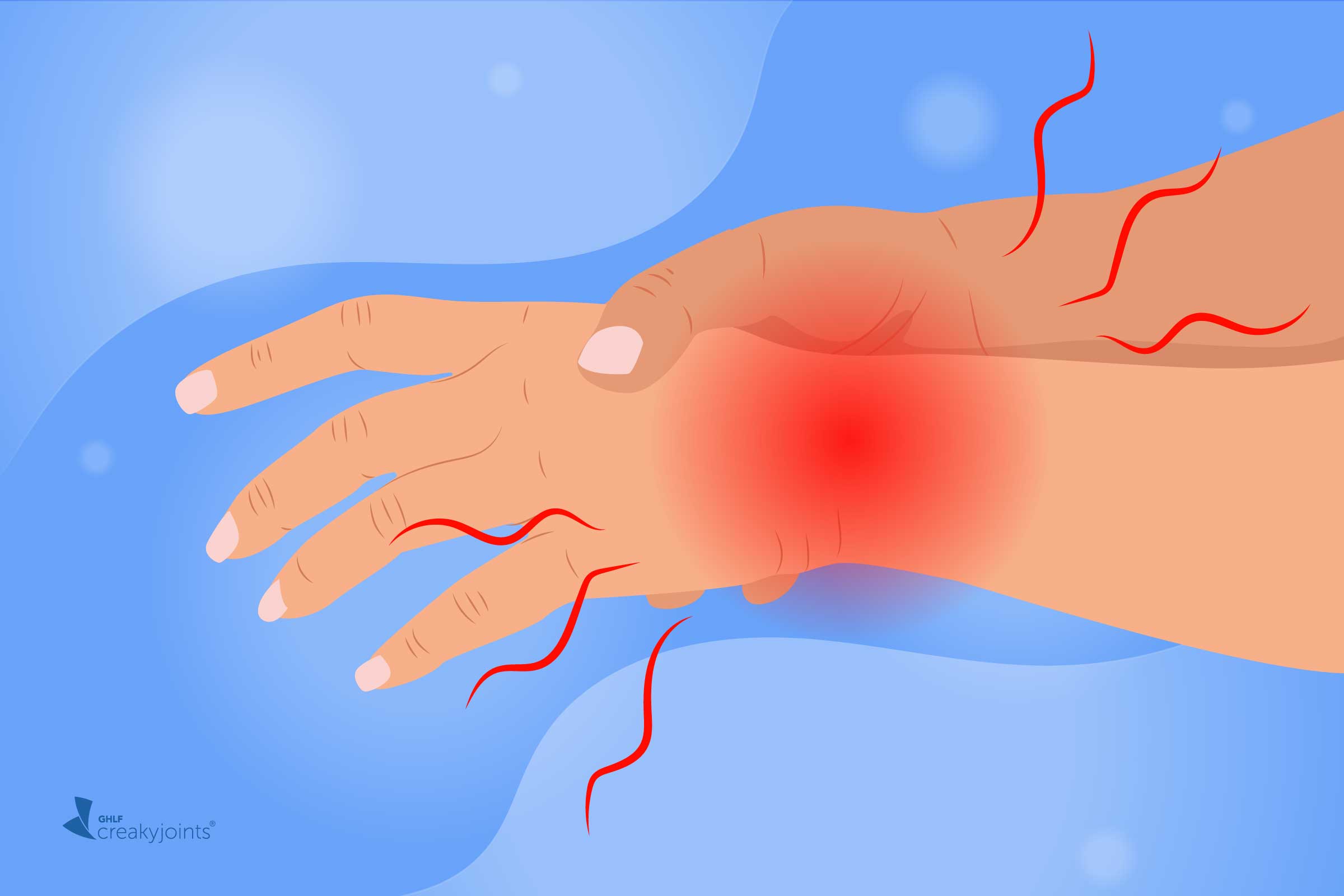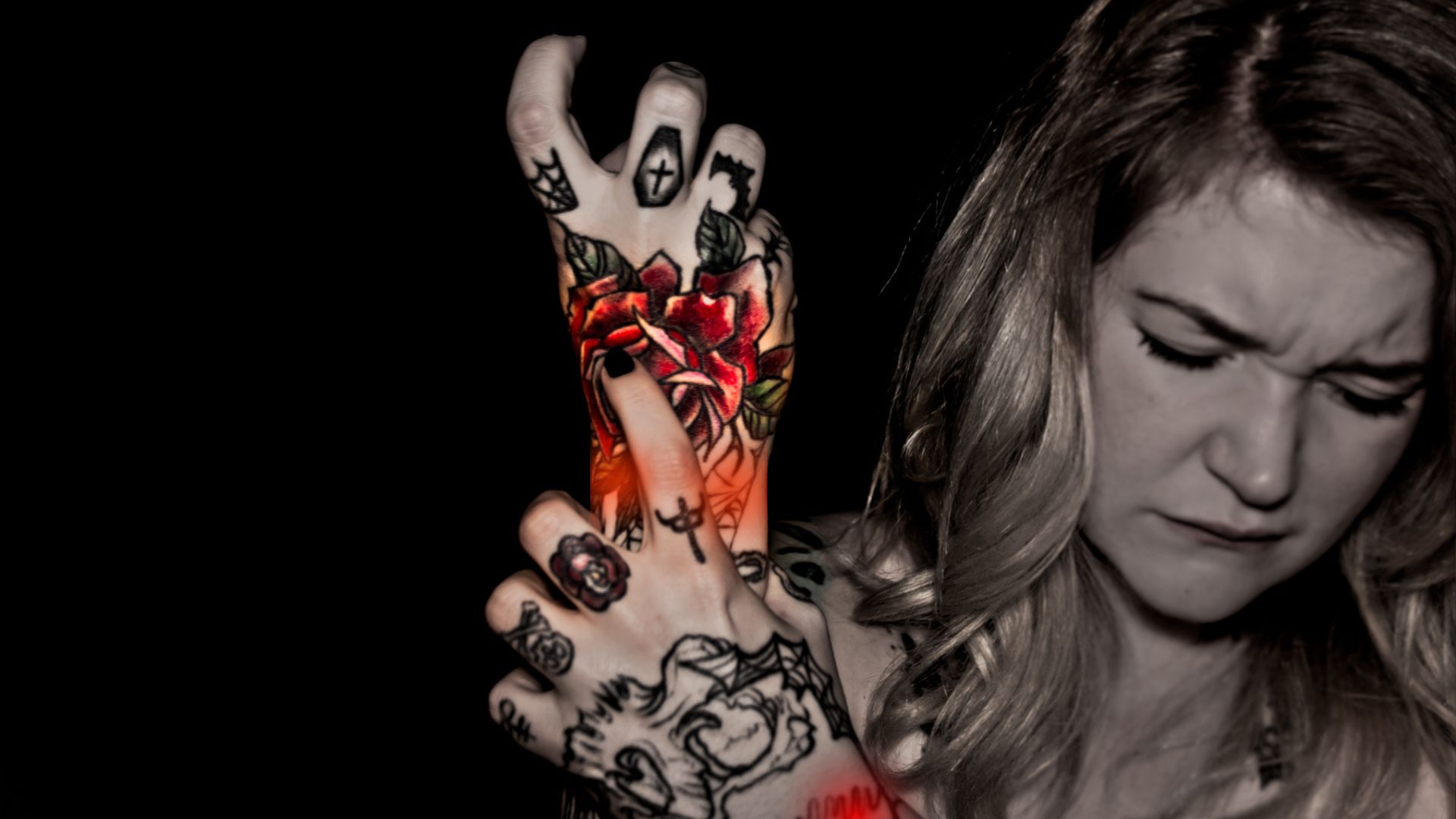It can be enough of a challenge to deal with psoriasis or psoriatic arthritis flare-ups — the physical appearance and itchy discomfort of psoriasis plaques is upsetting and frustrating for patients. But when psoriasis plaques begin to build up and flake off the skin, leaving behind dandruff-like “evidence” of the condition on your clothes and surroundings, it can make things even worse. Many patients feel like flaking adds to the stigma they already experience, in part because it calls more attention to the disease.
Psoriasis is an autoimmune condition that causes skin cell buildup that appears as red, scaly, itchy patches on your skin and scalp that can burn and sting. These plaques can also become so thick and dry that they start to flake off the skin in large, silver-toned scales. When it happens on your scalp, it can look like severe dandruff.
Research shows that about half of psoriasis patients experience scalp psoriasis, though some estimates say that 90 percent of patients will deal with scalp psoriasis at some point. Sometimes psoriasis plaques on your body shed their scales, too.
Psoriasis Skin Flakes: What Are They?
“Flakes in psoriasis are the dead cells at the outer layer of the skin that are being shed,” says Mitchell Bressack, MD, a dermatologist at Rush University Medical Center in Chicago who specializes in treating psoriasis. The outer layer of the skin (called the epidermis) normally turns over every 28 days, which means that it takes about a month for the bottom layer of cells to make their way to the top.
In people with psoriasis or psoriatic arthritis, however, “the cells at the base of the epidermis multiply more rapidly than normal and they progress from the base of the epidermis to the surface more rapidly than normal, so there’s an increase in the number of dead cells being shed from the surface of the skin on a daily basis,” Dr. Bressack says. This appears as scales, which can flake off in large pieces.
Dandruff vs. Psoriasis Flakes
While psoriasis flakes aren’t actually different than dandruff (they’re both dead skin cells), in many ways they can be more distressing, as they tend to be more intense, says Dr. Bressack. Some patients experience severe shedding of large flakes on their scalp or the areas of their body where their psoriasis flares. Flakes are, however, usually less noticeable on the body than the scalp, he says.
What causes skin to flake in dandruff versus in psoriasis is very different. Psoriasis flakes are the result of your overactive immune system speeding up the rate at which your skin cells grow, causing skin cell buildup — or plaques — that then may flake off. Garden-variety dandruff, on the other hand, can occur for a number of reasons, including skin that is too dry or oily, a fungal infection, or sensitivity to hair care products.
Treating psoriasis flakes with dandruff-oriented products alone may not work. You need medications that address the root cause of psoriasis with the appropriate topical, biologic, or systemic treatments.
The Mental Burden of Skin Flakes in Psoriasis and Psoriatic Arthritis
You don’t need a medical study to tell you that scaling and flaking is bothersome, but the evidence exists nonetheless: 65 percent of patients rank flaking, peeling, and shedding on their body as one of the top three most distressing symptoms they experience, per research published in The Journal of Dermatological Treatment.
“The problem with any skin disease is that it’s on the outside. You have to deal with how the world is interacting with you and your skin disease. It can cause a lot of pain and suffering,” says Amy Wechsler, MD, who is board-certified in both dermatology and psychiatry and author of the book The Mind-Beauty Connection. For instance, if psoriasis flakes are on your hands, you may be worried about shaking hands in work or social settings to say hello.
The challenge then becomes controlling and responding to flares, cleaning up flakes, and explaining them to friends, colleagues, and loved ones. “Generally, the more widespread the disease, or the more difficult it is to cover up, the greater the effect it has on quality of life,” says Dr. Bressack.
A 2020 study, which defined quality of life in part as well-being and happiness, found that psoriasis symptoms–along with social and clothing restrictions, the effect on professional life, and lack of a cure–impacted patient-perceived quality of life. It also discussed the stigma and prejudice patients suffer from the disease.
Psoriasis Flaking Causes: Factors that Make Them Worse
Interestingly, what causes flaking and shedding in psoriasis patients appears to be very individualized, says Dr. Bressack. Here are some environmental factors that can affect psoriasis skin flares and flakes:
UV Exposure
Some daily exposure to sunlight can help reduce psoriasis symptoms for many patients, but for others, it can make things worse, says Dr. Bressack. This can be one of the more confusing factors related to psoriasis flares. “Ultraviolet light is difficult to explain as a triggering factor for psoriasis, as it is also one of the most effective treatments we have,” he says. If you are one of the people who finds that UV exposure exacerbates symptoms, he recommends avoiding sunlight when possible and protecting yourself from it. Use a dermatologist-recommended sunscreen every day, wear a wide-brimmed hat, and sport lightweight, long-sleeved clothing.
Cold, Dry Weather
Psoriasis flares tend to happen in fall and winter with the emergence of cold, dry weather, although, “some patients actually get better,” says Dr. Bressack. The X-factor here is dropping humidity levels. “The warmer the weather, the more moisture the air holds. As it gets colder, there is less moisture in the air, and this can cause the skin to dry out, worsening psoriasis,” he says.
Stress, Lack of Sleep, and Other Lifestyle Factors
Some patients will report that certain dietary habits or stress make skin flaking worse, while others say that those factors have no impact. For example, in one study published in 2018 in the International Journal of Dermatology up to 88 percent of cases pointed to stress as a trigger for their psoriasis. There was also a higher incidence of psoriasis among patients who had experienced a traumatic event.
Some patients will report that certain dietary habits or stress make skin flaking worse, while others say that those factors have no impact. For example, in one study published in 2015 in the journal BMC Dermatology about half of patients surveyed said that stress caused psoriasis to get worse and could pinpoint a stressful period of their life that was linked to the onset of their disease.
“The thing about psoriasis is that it has a mind of its own,” says Dr. Wechsler. Psychological stress and lack of sleep certainly can make a flaking flare worse. “There’s a vicious cycle where the symptoms of the disease make you stressed, anxious, and down, and you don’t sleep as well. That, in turn, compromises skin healing, and the cycle repeats,” she says.
How to Prevent and Cope with Flaking
The good news is that “flakes can be treated and prevented,” says Dr. Bressack. There are some lifestyle habits you can develop to make living with psoriasis easier. Here’s how.
Hygiene and Cleansing
Use a special shampoo. If you have scalp psoriasis, the most effective over-the-counter shampoos contain coal tar. “This ingredient suppresses inflammation on the scalp,” says Dr. Bressack. Try Neutrogena T-Gel or DHS-Tar.
Salicylic acid is another good choice, as this exfoliates the scalp to remove scales by “loosening flakes so they shed more easily,” he says. Try Neutrogena T-Sal or DHA-Sal. Although this might cause an uptick in flaking initially, it is helping to clear them from the scalp, which may ease flaking in the long run.
You might also find that a traditional anti-fungal dandruff shampoo that contains zinc pyrithione or selenium sulfide helps to reduce flaking, though these are typically less effective. “Although psoriasis is not a fungal infection, fungi on the surface may play a role in the disease process,” says Dr. Bressack. Try Head and Shoulders and Selsun Blue. If those options don’t work as well as you’d like, talk to your doctor about a prescription shampoo or topical medication. Two examples, says Dr. Bressack, are prescription-strength ketoconazole shampoo (2% strength) or ciclopirox shampoo.
Suds frequently. You know the saying “lather, rinse, repeat”? That’s exactly what you want to do in order to remove more flakes. Don’t skip days assuming that the less you wash the fewer the flakes. “Shampooing more frequently often helps, as this removes the flakes before they can build up and become more noticeable,” says Dr. Bressack.
Use dandruff shampoo on your body plaques. Just because it’s a dandruff shampoo does not mean it’s only good for scalp care. You can try using them as a body wash to treat areas on your body affected by psoriasis, says Dr. Bressack. Use a soft washcloth or your hands; loofahs are too harsh. “While loofahs may remove flakes in the short run, they’d also create more irritation to already-inflamed skin, making the problem worse in the end,” he says.
Use moisturizer after you shower. To decrease excess scaling and encourage flakes to fall off, use a moisturizer with salicylic acid that is specific to psoriasis. Dr. Bressack likes CeraVe Psoriasis Moisturizing Cream with Salicylic Acid, which also contains exfoliating lactic acid, nourishing niacinamide, and hydrating, barrier-repairing ceramides.
Control itching. Scratching can make flakes worse. An over-the-counter oral antihistamine can help lessen this urge, says Dr. Wechsler. Loratadine (Claritin) and diphenhydramine (Zyrtec) are a couple of options, but always check with your doctor first to make sure they can be taken with your other medications.
Home Remedies
Try at-home topicals. Tea tree oil, coconut oil, or aloe vera are all topical solutions patients can try to moisturize psoriasis plaques, which may help prevent flaking. “These work for some people, but not for others,” Dr. Bressack says. It may take some experimenting to find one that soothes your skin and reduces scaling.
Soak up. If constant itching is dislodging scales, you might try a soothing bathtub soak, as some people report relief from bathing in colloidal oatmeal, Dead Sea salts, or a baking soda bath.
Dress in soft fabrics. Be gentle to your skin with soft, natural fabrics like cotton, says Dr. Bressack. These are typically kinder compared to rougher materials like wool, nylon, or polyester, he says. This is more for your own comfort, though; it likely won’t decrease the amount of excess scale.
Consider a Medication Change
If you’re struggling with an overload of flakes, you may need to evaluate and possibly switch medication. That can be frustrating, but there are many choices of targeted treatments on the market. “It can be trial and error, but everyone can be treated,” says Dr. Wechsler.
Psoriasis can be mild, moderate, or very severe, and these symptoms can change over time, so treatment that worked for you in the past may not be right for you now. If you’re currently being treated for mild psoriasis but are starting to have more severe disease, talk to your doctor about if it’s time to change your therapy. Here’s a brief overview of different types of treatment for psoriasis.
Topical Medications (applied to skin)
There are several options your doctor may recommend, including:
- Moisturizers, including heavier ointments like petroleum jelly (Vaseline) or Aquaphor may make the skin feel softer and smoother
- Corticosteroid creams, ointments, gels, shampoos, or sprays to reduce inflammation
- Tar shampoos, lotions/creams, and oils (also thought to reduce inflammation)
- Tazarotene (Tazorac, a retinoid or vitamin A derivative) and calciprotriene (Donovex, a vitamin D derivative) ), that helps regulate skin cell turnover
- Calcineurin inhibitors (most often used in skinfolds to treat plaques)
Phototherapy (exposure to UV light)
An in-office treatment from the dermatologist, UV light therapy involves exposing areas of affected skin for a set amount of time with a certain UV wavelength, which can slow the turnover of skin cells.
Oral Medications
Immune-modulating medications like methotrexate suppress the body’s immune response, thereby lessening the activity of the disease. Other options include acitretin, an oral retinoid that controls the rate at which skin cells multiply, and apremilast (Otzela), which works by decreasing inflammation.
Injectable or Infused Biologic Medications
These target specific parts and pathways of the immune system to control the over-reactivity that triggers psoriasis flares. These are the most powerful (and costly) options for treating psoriasis and are used in moderate to severe psoriasis or psoriatic arthritis. That said, flaking alone is not a sign that you would need to jump to systemic therapy. “Most people would not want to go on systemic medications simply for the flaking, as these can have significant side effects and can be extremely costly,” says Bressack. If you’re doing well (save for the flaking), you probably don’t need a systemic medication.
Examples include:
- adalimumab (Humira)
- etanercept (Enbrel)
- ixekizumab (Taltz)
- secukinumab (Cosentyx)
- brodalumab (Siliq)
- ustekinumab (Stelara)
- guselkumab (Tremfya)
- tildrakizumab (Ilumya)
- risankizumab (Skyrizi)
Get Support
Have an ‘Elevator Speech’
You don’t have to open up to the people in your circle about your psoriasis flakes. However, if you do want to say something, you can explain it with a short-and-sweet approach like this: “I have a condition, it’s called psoriasis. It’s not contagious, but it bothers me and I’m getting help,” says Dr. Wechsler. However, if the idea makes you cringe, don’t feel like you must say anything.
Find Online Groups
You might feel like you’re the only one struggling with psoriasis flakes. You’re not. “There is strength in numbers, and I recommend finding a support group. A lot of people feel alone but there are hundreds of thousands of people with psoriasis,” says Dr. Wechsler. Seeking out people who understand your experience can give you the mental support to reduce your anxiety over the disease and seek out the help you need. Social media can often be a great source of support. Look for virtual groups on Facebook or search on Instagram for people who are open to talking about their disease.
Use Stress Management Strategies
Reactions to stress can play a role in flares of psoriasis for some patients. Check in with yourself. Are you someone who lacks effective coping strategies? While stress is inevitable, research shows that it’s your perception of that stress that affects how damaging — or not — it is on your body. You may benefit by working with a mental health professional, especially one who uses cognitive behavioral therapy, to help you develop coping strategies and mindset shifts that relieve tension and anxiety associated with your disease and daily life.
Prioritize Sleep
Symptoms like itching can affect the quality of your sleep with psoriasis. The right treatments should help address the discomfort so you can nod off easier. But making time for sleep is important, too. “I tell patients that skin healing occurs during sleep,” says Dr. Wechsler. To make it easier to fall and stay asleep, practice good sleep hygiene, like turning off electronics 30 minutes before bed, not watching stressful/activating TV before bed, and doing relaxing activities like reading, she recommends.
Powerful Podcasts to Help You Live Better with Psoriasis
The Global Health Living Foundation/CreakyJoints is embracing audio storytelling as part of our mission to reach the chronic disease patient community where they are. Click here to listen to one of our many podcasts, including Getting Clear on Psoriasis, The Psoriatic Arthritis Club, Breaking Down Biosimilars, The Health Advocates, Talking Head Pain, MatterofVax, Gut Culture, and more.
Want to learn more?
Listen to this episode of Getting Clear on Psoriasis, from the GHLF Podcast Network.





